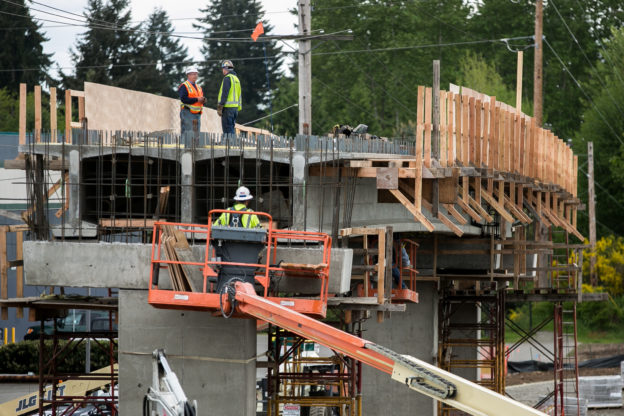In a Wednesday news conference, members of the Senate Freedom Caucus unveiled their new transportation-funding proposal, pushing back on a package recently put forth by the Democratic Chair of the Senate Transportation Committee and building on the plan from the ranking Republican on the committee. Senators Phil Fortunato, Doug Ericksen, Mike Padden, and Jim McCune are pushing for a comprehensive shift in how the state pays for transportation altogether by utilizing the existing sales tax on motor vehicles and ending the state’s reliance on the gas tax. A nonpartisan analysis done in 2019 shows that the plan would result in more than $10 billion in funding over the next decade, create tens of thousands of jobs and yield tens of billions of dollars in economic benefit for the state.
“As cars become more fuel efficient, commuting patterns change and new technology comes online, existing methods to fund the state’s transportation infrastructure are failing,” said Fortunato, R-Auburn. “Proposals being discussed in Olympia continue an unsustainable cycle of project lists and taxes, including a new cap and tax proposal, carbon taxes and an intrusive mileage tax. All these approaches fail to address underlying cost-drivers for transportation projects – inflation.”
Portions of the plan have received hearings over the years and even the Democratic chair of the Senate Transportation Committee noted that it was “probably the right thing to do…”
“Voters are tired of paying more taxes just to be stuck in traffic,” Ericksen, R-Ferndale said. “It’s time to do the right thing by taxpayers and ensure their money is being spent on what it’s intended. We can get more resources for roads and bridges without new taxes under our proposal. It’s the responsible and sustainable policy for our state’s transportation needs.”
A Democrat-proposed mileage tax, also known as a road usage charge, is currently in a pilot project phase in Washington. To function as a replacement for the gas-tax, Washington drivers would have to install a GPS tracker in their vehicles, which would then report miles traveled to a third-party. Freedom Caucus members warn this is an unacceptable invasion of privacy by the government and a costly one. As much as 30 percent of the collected mileage tax would go to the third-party vendor.
“Our approach avoids an intrusive and inefficient mileage tax,” explained Padden, R-Spokane Valley. “It’s unconscionable that the state would require a GPS tracker in your car, track your movements through a third-party who in turn charges exorbitant fees to collect the tax. The mileage tax is bad for eastern Washington and will drive up costs for commuters and consumers without any guarantee our roads will be any better. This is the only package that meets the ever-growing transportation needs of Spokane County.”
The Freedom Caucus’ proposal includes protections for the redirected revenues and asks voters to weigh-in with a state constitutional amendment.
“We cannot wait any longer to make these investments and we cannot afford to saddle future Washingtonians with more taxes only to have their investments wasted while they drive on crumbling roads,” said McCune, R-Graham. “That is why part of our plan includes a constitutional provision to protect that money.”















